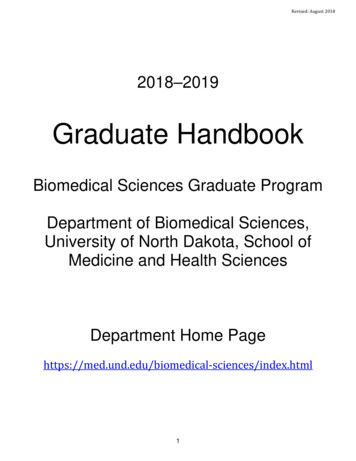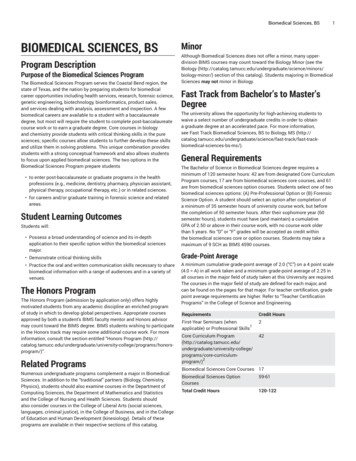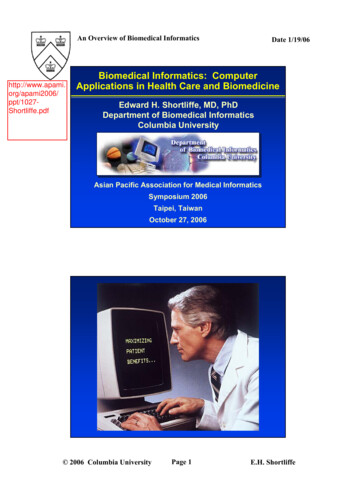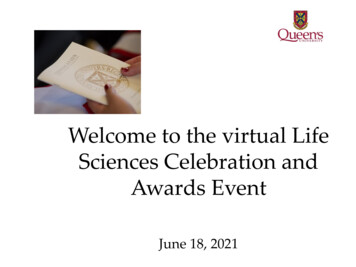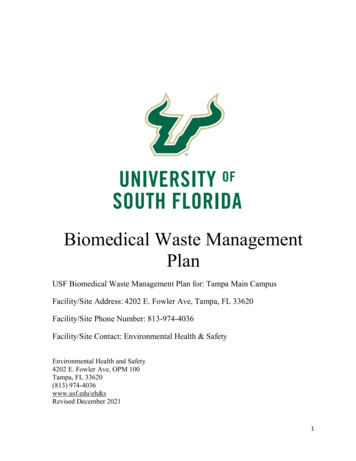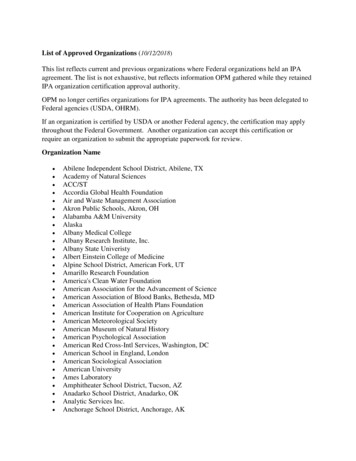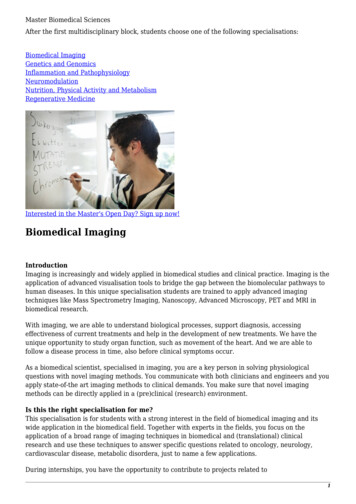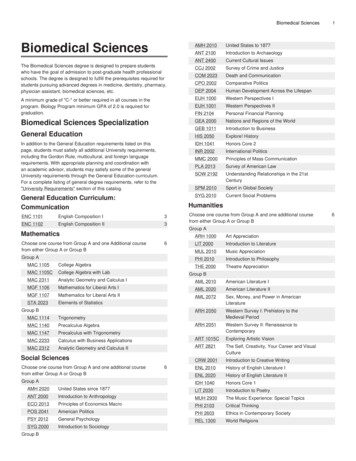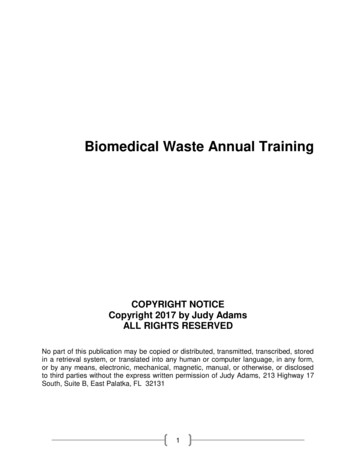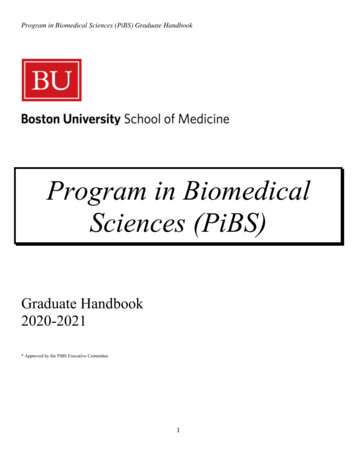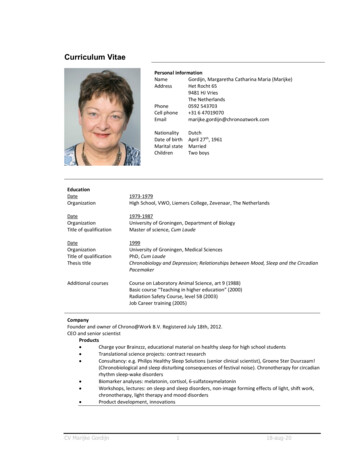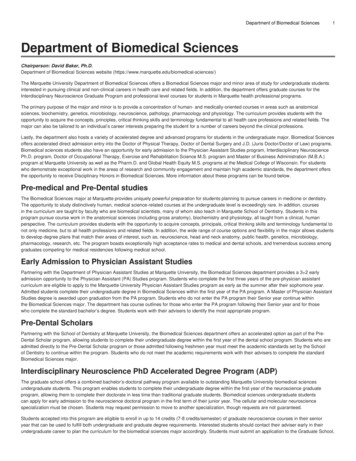
Transcription
Department of Biomedical Sciences1Department of Biomedical SciencesChairperson: David Baker, Ph.D.Department of Biomedical Sciences website e Marquette University Department of Biomedical Sciences offers a Biomedical Sciences major and minor area of study for undergraduate studentsinterested in pursuing clinical and non-clinical careers in health care and related fields. In addition, the department offers graduate courses for theInterdisciplinary Neuroscience Graduate Program and professional level courses for students in Marquette health professional programs.The primary purpose of the major and minor is to provide a concentration of human- and medically-oriented courses in areas such as anatomicalsciences, biochemistry, genetics, microbiology, neuroscience, pathology, pharmacology and physiology. The curriculum provides students with theopportunity to acquire the concepts, principles, critical thinking skills and terminology fundamental to all health care professions and related fields. Themajor can also be tailored to an individual’s career interests preparing the student for a number of careers beyond the clinical professions.Lastly, the department also hosts a variety of accelerated degree and advanced programs for students in the undergraduate major. Biomedical Sciencesoffers accelerated direct admission entry into the Doctor of Physical Therapy, Doctor of Dental Surgery and J.D. (Juris Doctor/Doctor of Law) programs.Biomedical sciences students also have an opportunity for early admission to the Physician Assistant Studies program, Interdisciplinary NeurosciencePh.D. program, Doctor of Occupational Therapy, Exercise and Rehabilitation Science M.S. program and Master of Business Administration (M.B.A.)program at Marquette University as well as the Pharm.D. and Global Health Equity M.S. programs at the Medical College of Wisconsin. For studentswho demonstrate exceptional work in the areas of research and community engagement and maintain high academic standards, the department offersthe opportunity to receive Disciplinary Honors in Biomedical Sciences. More information about these programs can be found below.Pre-medical and Pre-Dental studiesThe Biomedical Sciences major at Marquette provides uniquely powerful preparation for students planning to pursue careers in medicine or dentistry.The opportunity to study distinctively human, medical science-related courses at the undergraduate level is exceedingly rare. In addition, coursesin the curriculum are taught by faculty who are biomedical scientists, many of whom also teach in Marquette School of Dentistry. Students in thisprogram pursue course work in the anatomical sciences (including gross anatomy), biochemistry and physiology, all taught from a clinical, humanperspective. The curriculum provides students with the opportunity to acquire concepts, principals, critical thinking skills and terminology fundamental tonot only medicine, but to all health professions and related fields. In addition, the wide range of course options and flexibility in the major allows studentsto develop degree plans that match their areas of interest, such as, neuroscience, head and neck anatomy, public health, genetics, microbiology,pharmacology, research, etc. The program boasts exceptionally high acceptance rates to medical and dental schools, and tremendous success amonggraduates competing for medical residencies following medical school.Early Admission to Physician Assistant StudiesPartnering with the Department of Physician Assistant Studies at Marquette University, the Biomedical Sciences department provides a 3 2 earlyadmission opportunity to the Physician Assistant (PA) Studies program. Students who complete the first three years of the pre-physician assistantcurriculum are eligible to apply to the Marquette University Physician Assistant Studies program as early as the summer after their sophomore year.Admitted students complete their undergraduate degree in Biomedical Sciences within the first year of the PA program. A Master of Physician AssistantStudies degree is awarded upon graduation from the PA program. Students who do not enter the PA program their Senior year continue withinthe Biomedical Sciences major. The department has course outlines for those who enter the PA program following their Senior year and for thosewho complete the standard bachelor’s degree. Students work with their advisers to identify the most appropriate program.Pre-Dental ScholarsPartnering with the School of Dentistry at Marquette University, the Biomedical Sciences department offers an accelerated option as part of the PreDental Scholar program, allowing students to complete their undergraduate degree within the first year of the dental school program. Students who areadmitted directly to the Pre-Dental Scholar program or those admitted following freshmen year must meet the academic standards set by the Schoolof Dentistry to continue within the program. Students who do not meet the academic requirements work with their advisers to complete the standardBiomedical Sciences major.Interdisciplinary Neuroscience PhD Accelerated Degree Program (ADP)The graduate school offers a combined bachelor’s-doctoral pathway program available to outstanding Marquette University biomedical sciencesundergraduate students. This program enables students to complete their undergraduate degree within the first year of the neuroscience graduateprogram, allowing them to complete their doctorate in less time than traditional graduate students. Biomedical sciences undergraduate studentscan apply for early admission to the neuroscience doctoral program in the first term of their junior year. The cellular and molecular neurosciencespecialization must be chosen. Students may request permission to move to another specialization, though requests are not guaranteed.Students accepted into this program are eligible to enroll in up to 14 credits (7-8 credits/semester) of graduate neuroscience courses in their senioryear that can be used to fulfill both undergraduate and graduate degree requirements. Interested students should contact their adviser early in theirundergraduate career to plan the curriculum for the biomedical sciences major accordingly. Students must submit an application to the Graduate School,
2Department of Biomedical Sciencesindicate their interest in the accelerated degree program and meet all other admission criteria as stated in the Application Requirements section. GREtest scores are not required.Direct Admit Physical TherapyPartnering with the Physical Therapy program at Marquette University, the Biomedical Sciences department offers an accelerated option for the DirectAdmit Physical Therapy program, allowing students to complete their undergraduate degree within the first year of the professional phase of theprogram. Students who are admitted directly to the Physical Therapy program or those admitted following their junior year (space permitting) must meetthe academic standards set by the Physical Therapy Department to continue within the program. Students who do not meet the academic requirementswork with their advisers to complete the standard Biomedical Sciences major.EXERCISE AND REHABILITATION SCIENCE M.S. ACCELERATED DEGREE PROGRAMThe Department of Biomedical Sciences together with the Graduate School offers an accelerated degree program which allows accepted students tocomplete graduate course work in the Exercise and Rehabilitation Science M.S. program in their senior year of undergraduate study.Marquette undergraduate students majoring in Biomedical Sciences can apply for admission to the Exercise and Rehabilitation Science M.S. programin their junior year. Students accepted into the program are eligible to enroll in up to 14 (or 17) credits of graduate course work during the senior year.Credits earned for graduate courses can be used to fulfill both undergraduate and graduate degree requirements.Early Assurance PharmD ProgramThe Biomedical Sciences department participates in the Early Assurance PharmD program through the university’s partnership with the Medical Collegeof Wisconsin (MCW) School of Pharmacy. The 3 3 Early Assurance PharmD program allows students in the Biomedical Sciences major to earn dualdegrees, a bachelor’s degree from Marquette University and a Doctor of Pharmacy degree from the Medical College of Wisconsin, in a total of six years.Students accepted to this program who meet all eligibility requirements throughout the program, can matriculate to MCW’s Schools of Pharmacy in theirsenior year. A bachelor of science degree from Marquette University is awarded after successful completion of the first year at MCW. Applications tothe program are due at the start of the spring term in freshman or sophomore year. Interested students should consult with their academic adviser inbiomedical sciences. More detailed information can be found in the university Special Academic Programs programs/pharmdprogram/) section of this bulletin.GLOBAL HEALTH EQUITY M.S. ACCELERATED DEGREE PROGRAMThe Department of Biomedical Sciences together with the Medical College of Wisconsin Global Health Equity M.S. program offers an accelerateddegree program which allow students to earn their B.S. in Biomedical Sciences, and a master of science (M.S.) in Global Health Equity, all within a fiveyear time period.Marquette undergraduate students majoring in Biomedical Sciences can apply for admission to the Global Health Equity M.S. program in the secondterm of their junior year. Students accepted into the program are eligible to enroll in up to 12 credits of pre-approved course work during the senior yearto fulfill both undergraduate and graduate degree requirements.Due to the structure of the program within the senior year, careful planning as early as sophomore year is encouraged. Interested students shouldcontact their undergraduate adviser to be connected with the program contact within the Biomedical Sciences Department.Pre-Law ScholarsPartnering with the Law School at Marquette University, the Biomedical Sciences department offers an accelerated option as part of the Pre-LawScholar program, allowing students to complete their undergraduate degree within the first year of the law school program. Students who are admitteddirectly to the Pre-Law Scholar program must meet the academic standards set by the Law School to continue within the program. Students who do notmeet the academic requirements work with their advisers to complete the standard Biomedical Sciences major.MBA Accelerated Degree Program (ADP)Marquette undergraduate students majoring in Biomedical Sciences can apply for admission to the Master of Business Administration (M.B.A.) programin the second term of their junior year. Students accepted into this program are eligible to enroll in up to 12 credits of M.B.A. course work that carrygraduate credit during their senior year. Credits obtained for these courses can be used to fulfill both undergraduate and graduate degree requirements.Due to the number of prerequisite courses required for admission to the M.B.A. program, the M.B.A. accelerated degree option requires careful planningas early as freshman year. Interested students should contact their adviser early in their undergraduate career. Once students inform the GraduateSchool of Management of their completion of undergraduate degree requirements, their admission as a regular degree status (RDS) student in theGraduate School of Management is activated.Disciplinary Honors ProgramThe Disciplinary Honors Program in Biomedical Sciences is designed for students to demonstrate exceptional work in the areas of research andcommunity engagement, and maintain high academic standards. Students involved in this program must go beyond normal expectations in these areasby generating an honors proposal that integrates course work, research, community engagement, writing and oral presentations into a coherent plan of
Department of Biomedical Sciences3work. There are two specific focuses within the program, one in which the emphasis is on scientific research and the other on community engagement,although all students must include some experience in each area.Graduation with Disciplinary Honors in Biomedical Sciences requires completion of the portfolio and participation in a second-term senior year capstonecourse. Students are also required to prepare a presentation describing how they completed their honors plan.Degree requirementsAcademic PerformanceAll students must comply with the College of Health Sciences graduation requirements. Candidates for a degree must earn at least the minimum numberof credits listed in their curriculum and a minimum GPA of 2.000 (C average). Students must earn a C- or better in all major courses. Major coursescompleted with a D or below do not count toward the 33 credits required for the BISC major (or 18 credits for the minor), but do count toward theminimum 128 total credits required for the B.S. degree. A waiver may be submitted if a BISC content area course taken in the senior year is completedwith a grade of D or D provided students complete at least 33 credits in the major with a C- or above and meets the minimum BISC major gpa of 2.000or above. A waiver request will be granted for no more than one course and cannot be applied towards the BISC required courses (BISC 3135, 4145 orbiochemistry).Candidates for the baccalaureate degree with a major in Biomedical Sciences must complete a minimum of 128 credit hours including thefollowing requirements:AreaCredit HoursMarquette Core Curriculum (MCC)30Required Foundational Courses25-32Major33General Electivesto achieve 128 total creditsMarquette Core Curriculum (MCC) - 30 CreditsRefer to the Marquette Core Curriculum (MCC) in the University section of this bulletin for courses that will meet requirements. The university allows amaximum of two courses in the Discovery Tier to apply towards a primary major.Required Foundational CoursesAll students are required to complete:CodeTitleBIOL 1001General Biology 13BIOL 1002General Biology 23CHEM 1001General Chemistry 14CHEM 1002General Chemistry 24CHEM 2111Organic Chemistry 11-4or BISC 2050HoursOrganic Chemistry for the Health SciencesOne of the following laboratory science courses:BIOL 2001Principles of Biological InvestigationBISC 4147Human Physiology LaboratoryBISC 4165Microbiology LaboratoryMLSC 2200Concepts in Medical Laboratory SciencePHAS 7270Diagnostics Technology (For students admitted to the PA program)One of the following statistics courses:MATH 1700Modern Elementary StatisticsMATH 4720Statistical MethodsMATH 4740Biostatistical Methods and ModelsSOCI 2060Social StatisticsOne of the following Health and Society Courses:BISC 4153Epidemiology (Can be used as a Health and Society Cognate or BISC elective, but not both)BISC 4157Global HealthBISC 4170Biology, Moral Behavior and Policy (Can be used as a Health and Society Cognate or BISC elective, butnot both)1-432-3
4Department of Biomedical SciencesBISC 4381Politics of U.S. Health Care (or POSC 4381 with special permission)BISC 4461Comparative Health Politics and Policy (or POSC 4461 with special permission)CMST 4500Health CommunicationENGL 3222Writing for Health and MedicineENGL 3761Medicine and LiteratureHEAL 1025Culture and HealthHEAL 1200Women's HealthHEAL 1400Veteran Health and CultureHEAL 2100Primary Health Care ConceptsHEAL 3200Bioethics for Healthcare: Foundations, Dilemmas and Decision-Making (Can be used as a Health andSociety Cognate or Medical Ethics Cognate, but not both)MLSC 2060Public HealthPHAS 7116Clinical Decision Making 2 (for students admitted to the PA program)PSYC 2101Introduction to Life-Span Developmental Psychology for the Health ProfessionsPSYC 3101Developmental Psychology: Conception Through AdolescencePSYC 3120Developmental Psychology: Adulthood and AgingPSYC 3220Human SexualityPSYC 3420Health PsychologySOCI 3300Sociology of the Life CourseSOCI 3500Culture, Health and IllnessSOCI 3520Health Care SystemsSOCI 3550Race, Gender and MedicineSOCI 3570Men, Masculinities and HealthSOCI 4300Sociology of AgingSOWJ 1001Introduction to Social Welfare and JusticeSOWJ 2200Human Behavior in the Social EnvironmentSOWJ 4700Global Aid and HumanitarianismSPAN 4715Advanced Spanish for Health CareTHEO 3460Theology and Global HealthNote: Biomedical Sciences often offers special topics courses (BISC 4930 and BISC 4931) which may be approved for the Health and Societycognate. Students should confirm with their adviser whether a course fulfills the requirement. To request approval, a student must submit aHealth and Society Approval Form, available in the department office.One of the following medical ethics courses (minimum 1 credit):HEAL 3200Bioethics for Healthcare: Foundations, Dilemmas and Decision-Making (Can be used as a Health andSociety Cognate or Medical Ethics Cognate, but not both, 3 credits)PHIL 4335Biomedical Ethics (3 credits)PHIL 4336Applied Ethics for the Health Sciences (1 credit)THEO 4450Medical Ethics (3 credits)1One of the following disease and pathology courses (can apply to both the cognate and BISC major required courses if completed with a C- orbetter):BISC 3150General PathologyBISC 4120Pharmacology (BISC 7220 for students admitted to PA program)or BISC 72203Medical PharmacologyBISC 4160Molecular PathologyOCTH 7150Clinical and Health Conditions 1 (for students admitted to the OTD program)PHTH 7515Clinical Pathology and Pathophysiology (for students admitted to the DPT program)Total Credit Hours:25-32Students who are interested in pursuing a professional or graduate education (i.e. pre-med, pre-dental) should take the following courses:CodeTitleCHEM 2111Organic Chemistry 1CHEM 2112Organic Chemistry 2PHYS 1001General Physics 1Hours
Department of Biomedical SciencesPHYS 1002General Physics 2BIOL 2001Principles of Biological InvestigationMATH 1410Calculus for the Biological SciencesSOCI 1001Principles of SociologyPSYC 1001General Psychology5Typical four-year curriculum plans for Biomedical Sciences (p. 7), Pre-Physician Assistant Studies (p. 10), Direct Admit Physical Therapy(p.), Pre-PharmD program (p. 12), STEM-MBA and Pre-Dental Scholars (p. 9) follow the listing of Biomedical Sciences Majorrequirements.Biomedical Sciences MajorTypical four-year curriculum plans for Biomedical Sciences (p. 7), Pre-Physician Assistant Studies (p. 10), Direct Admit Physical Therapy(p. 8), Pre-PharmD program (p. 12), Pre-Dental Scholars (p. 9), Neuroscience PhD ADP (p. 13), Exercise Sciences and RehabilitationScience MS ADP (p.), and Occupational Therapy OTD ADP (p.) follow the listing of Biomedical Sciences Major requirements.BIOMEDICAL SCIENCES MAJORThe major in biomedical sciences consists of a minimum of 33 credit hours completed with a C- grade or better and meet a minimum cumulative GPA of2.000. A maximum of 9 transfer credits can be applied towards the major. The major includes the following requirements:Biomedical Sciences Major: Required Courses (three courses, 11-12 credits)CodeTitleBISC 3135Clinical Human AnatomyBISC 3213Biochemistryor BISC 2070BISC 4145Hours43-4Biochemistry for the Health ProfessionsHuman Physiology14Total Credit Hours:11-12Biomedical Sciences major: Content Areas (Five courses, minimum 15 credits):Choose two courses (6 credits) from each of the two content areas listed below, plus an additional course (3 credits) from either content area. At leastone of the five courses must also be designated as fulfilling the Disease and Pathology cognate. Courses eligible for the Disease and Pathology cognatecan only fulfill both the content course requirement and Disease and Pathology cognate if it is completed with a C- or better. If the course is completedwith a D or D , it can fulfill the cognate, but the student will need to complete an additional content course with a C- or better in order to fulfill the majorrequirements.CodeTitleHoursAnatomy and Systems Content Area (BISC AS) - 2 courses, minimum 6 credits6BISC 3110Nutritional Aspects of HealthBISC 3112Head and Neck AnatomyBISC 3150General PathologyBISC 3850Systems NeuroscienceBISC 4010Neuroeconomics: The Neuroscience of Decision MakingBISC 4113Anatomy Teaching PracticumBISC 4120/7220Pharmacology (Substitute BISC 7220 for MPA program only)21,21BISC 4140/5140Functional NeuroanatomyBISC 4155/5155Diseases of the BrainBISC 4173/5173Principles of Human Embryology111BISC 4325/5325EndocrinologyBISC 4514/7514Human MicroanatomyBISC 7130Human Gross Anatomy (5 credits; must be enrolled in the DPT or OTD program)BISC 7230Medical Anatomy (6 credits; must be enrolled in the MPA program)BISC 7515Biomedical Systems 1 (Pre-Dental Scholars only)BISC 8002Neuroscience Foundations 2 (NRSC PhD only)EXPH 5192Advanced Exercise Physiology (EXRS MS only)OCTH 7150Clinical and Health Conditions 1 (OTD program only)2
6Department of Biomedical SciencesPHTH 7515Clinical Pathology and Pathophysiology (only for students admitted to DPT program)2Note: BISC 9391 Signifies transfer credit for the Anatomy and Systems content areaCellular and Molecular Content Area (BISC CM) - 2 courses, minimum 6 creditsBISC 3115/7410Human Microbiology (BISC 7410 for Pre-Dental Scholars only)BISC 4020Molecular NeuroscienceBISC 4160/5160Molecular PathologyBISC 4210Biology of AgingBISC 4340/5340Human and Applied Medical GeneticsBISC 4342Epigenetics and Human DiseaseBISC 8001Neuroscience Foundations 1BIOL 3201GeneticsBIOL 3301Cell BiologyBIOL 4501Cellular NeurobiologyBIOL 4806Immunobiology611, 21Content Elective (BISC AS/CM) - one course, minimum 3 credits3One additional course from either the BISC AS or BISC CM content areas listed aboveTotal Credit Hours:15Biomedical Sciences Major: Electives 6-7 CreditsSelect from the following list, or any additional courses within the Anatomy & Systems or Cellular & Molecular content areas listed above, to total the 33credit hours required for the major completed with a minimum grade of C-.CodeTitleBISC 1001Contemporary Issues in Biomedical Sciences (required course for all first semester freshman)1BISC 1030Introduction to Dentistry (can only be applied as an elective for Pre-Dental Scholars)1BISC 2020Medical Terminology1BISC 3136Gross Anatomy for the Biomedical Sciences2BISC 3859Evolution3BISC 4113Anatomy Teaching Practicum3BISC 4142/4142HScience and Society1BISC 4146/4146HPhysiology In Depth: Contemporary Issues1BISC 4147Human Physiology Laboratory (can fulfill Laboratory Science Cognate or BISC elective, but not both)1BISC 4150Outbreaks, Epidemics and Pandemics3BISC 4151/4151HAdvanced Pathology1BISC 4153Epidemiology (can fulfill Health and Society Cognate or BISC elective, but not both)3BISC 4157Global Health (can fulfill Health and Society Cognate or BISC elective, but not both)3BISC 4159/7159Public Health Program Planning, Implementation and Evaluation3BISC 4165Microbiology Laboratory (can fulfill Laboratory Science Cognate or BISC elective, but not both)1BISC 4170Biology, Moral Behavior and Policy (can fulfill Health and Society Cognate or BISC elective, not both)3BISC 4214/4214HAdvanced Biochemistry1BISC 4275Modern Plagues: Stress, Trauma and Addiction3BISC 4341/4341HAdvanced Cellular Genetics and Cancer1BISC 4460Practical Cases in Medicine3BISC 4851/4851HAdvanced Systems NeuroscienceBISC 4931Topics in Biomedical SciencesBISC 4953Readings in Human Anatomyor BISC 4953HHours11-31Honors Readings in Human AnatomyBISC 4986Internship in Biomedical Sciences (maximum 6 credits, 3 credits toward BISC major)1-3BISC 4987Internship in Biomedical Sciences-Grading Period (maximum 6 credits, 3 credits toward BISC major)1-3BISC 4988Research Internship in Biomedical Sciences (maximum 6 credits, 3 credits toward BISC major)1-3BISC 4989Research Internship in Biomedical Sciences-Grading Period (maximum 6 credits, 3 credits toward BISCmajor)1-3
Department of Biomedical Sciences7BISC 4991HHonors Community Engagement in Biomedical Sciences (Only for students in the Disciplinary HonorsProgram; maximum 6 credits, 3 credits toward BISC major)1-3BISC 4995/4995HIndependent Study in Biomedical Sciences (Maximum 6 credits, 3 credits toward BISC major)1-3BISC 4997HCapstone for Disciplinary Honors Program in Biomedical Sciences (Only for students in the DisciplinaryHonors Program)1BISC 7516Biomedical Systems 2 (only for Pre-Dental Scholars)4BIOL 4102Experimental Molecular Biology3BIOL 4202Experimental Genetics3BIOL 4302Experimental Cell Biology3BIOL 4502Experimental Neurobiology3BIOL 4702Experimental Physiology3BIOL 4802Experimental Microbiology3MLSC 2050Forensic Science3MLSC 2060Public Health (can fulfill Health and Society Cognate or BISC elective, but not both)3MLSC 4124Medical Microbiology 14MLSC 4127Medical Microbiology 24OCTH 7190Neuroanatomy3PHAS 7260Pediatric Medicine (only for students admitted to MPA program)3PHTH 7120Pharmacology in Physical Therapy (only for students admitted to DPT program)2A maximum of nine transfer credit hours can be applied toward the requirements for a major125000-8000 level courses only for students enrolled in pre-approved graduate programs.Denotes course fulfills the Disease and Pathology cognate requirement (see Degree Requirements tab)Curricula InformationTypical Program for Biomedical Sciences MajorsFreshmanFirst TermHoursBISC 1001BIOL 10011 BIOL 10021CHEM 1001Second Term13 CHEM 10021Hours3144 PSYC 1001 or ELECTIVE13ENGL 1001 or ESSV1 (MCC)3 PHIL 1001 or THEO 1001 (MCC)3PHIL 1001 or THEO 1001 (MCC)3 ENGL 1001 or ESSV1 (MCC)3Elective31716SophomoreFirst TermHoursHours1BISC 31354 CHEM 2112 or ELECTIVECHEM 2111 or BISC 2050 (and 3 cr. electives)44 BISC 2070 or 32131MATH 1410 or ELECTIVE3-43 Statistics cognateCORE 1929DSCV (MCC)Second Term3 DSCV (MCC)2,332, 333 Elective31716-17JuniorFirst TermPHYS 1001 or ELECTIVEHours1Second Term4 PHYS 1002 or ELECTIVEHours14
8Department of Biomedical SciencesBISC 41454 BISC Anatomy & Systems (AS)3BISC Anatomy & Systems (AS)3 BISC Cellular & Molecular (CM)3BIOL 2001 (or other Lab cognate)3 Health & Society cognate33 Medical Ethics cognate1DSCV (MCC)2, 31714SeniorFirst TermHoursSecond TermHoursBISC Cellular & Molecular3 Disease & Pathology Cognate3BISC Elective3 BISC Anatomy & Systems or Cellular & Molecular (AS/CM)3DSCV (MCC)2, 33 BISC ElectiveElective3-26 CORE 4929 (MCC)3Elective41516-15Total Credit Hours: 128123Courses required for many post-graduate/professional programs, consult with specific program(s) of interest to confirm prerequisites.The four courses in the Discovery Tier (DSCV) of the MCC must be completed in the same theme and include the following content areas:Humanities (HUM), Social Science (SSC), Natural Science and Mathematics (NSM) and one elective (ELE), which is any additional course fromany of the three content areas. A maximum of two courses in the Discovery Tier can apply towards a primary major.Students must also complete the Writing Intensive (WRIT) and Engaging Social System and Values 2 (ESSV2) requirements of the MCC. Theserequirements can be fulfilled through designated courses in the Discovery Tier or other degree requirements.Typical Program for Biomedical Sciences Majors - Direct Admit Physical Therapy StudentsPartnering with the Physical Therapy program at Marquette University, the Biomedical Sciences Department has established an accelerated optionfor the Direct Admit Physical Therapy program, allowing students to complete their undergraduate degree after the first year of the professional phaseof the program. Students who were admitted directly to the Physical Therapy Program or those admitted following their Junior year (space permitting)must meet the academic standards set by the Physical Therapy Department to continue in the program. Students who do not meet the academicrequirements work with their advisers to complete the standard Biomedical Sciences major.FreshmanFirst TermHoursSecond TermHoursBISC 10011 BIOL 10023BIOL 10013 CHEM 10024CHEM 10014 PSYC 10013ENGL 1001 or ESSV1 (MCC)3 PHIL 1001 or THEO 1001 (MCC)3PHIL 1001 or THEO 1001 (MCC)3 ENGL 1001 or ESSV1 (MCC)3Elective31716SophomoreFirst TermHoursSecond TermHoursBISC 31354 BISC 2070 (or BISC 3213 for 4 cr.)3BISC 20501 Statistics cognate3PSYC 2101 (or PSYC 3101, 3120 or 3410 for DPT)3 Health and Society Cognate331CORE 1929 (MCC)3 PHTH 1001
Department of Biomedical SciencesDSCV (MCC)1,2Elective93 DSCV (MCC)1, 232 DSCV (MCC)1, 231616JuniorFirst TermHoursSecond TermHoursPHYS 10014 PHYS 10024BISC 41454 BISC Cellular & Molecular (CM)3BISC Cellular & Molecular (CM)3 BISC Anatomy & Systems or Cellular & Molecular (AS/CM)3BIOL 20013 BISC Elective/General ElectiveDSCV (MCC)1, 2333 Medical Ethics cognate1CORE 4929 (MCC)31717SeniorFirst TermHoursSecond TermHoursBISC 7130 (BISC AS)5 PHTH 7120 (BISC Elective)2PHTH 4512 (ESSV2)3 PHTH 7515 (BISC AS and DP Cognate)4Remaining DPT Curriculum6 Remaining DPT Curriculum91415Total Credit Hours: 128123The four courses in the Discovery Tier (DSCV) of the MCC must be completed in the same theme and include the following content areas:Humanities (HUM), Social Science (SSC), Natural Science and Mathematics (NSM) and one elective (ELE), which is any additional course fromany of the three content areas. A maximum of two courses in the Discovery Tier can apply towards a primary major.Students must also complete the Writing Intensive (WRIT) requirement of the MCC prior to senior year (DPT4). This requirement can be fulfilledthrough designated courses in the Discovery Tier or other degree requirements. The ESSV2 requirement of the MCC will be fulfill in the senioryear with PHTH 4512 (DPT4 course).Need to complete at least 22 of the 33 BISC major credits prior to entering the DPT4 year. The remaining 11 credits will be completed in theDPT curriculum.Typical Program for Biomedical Sciences Majors - Pre-Dental ScholarsPartnering with
The Department of Biomedical Sciences together with the Medical College of Wisconsin Global Health Equity M.S. program offers an accelerated degree program which allow students to earn their B.S. in Biomedical Sciences, and a master of science (M.S.) in Global Health Equity, all within a five-year time period.
